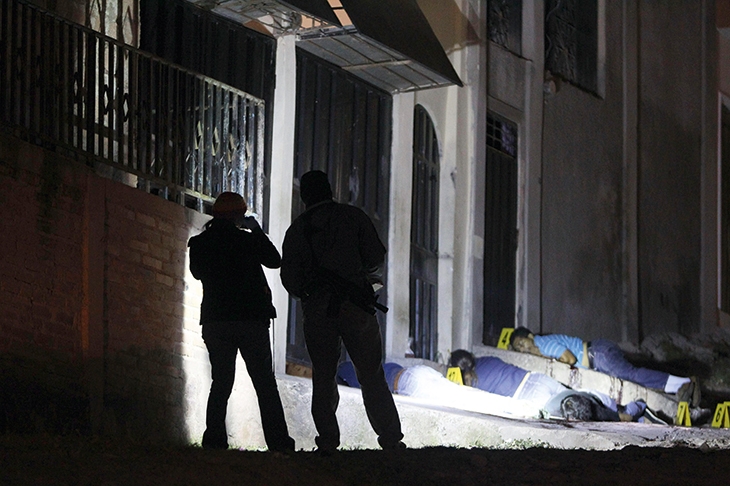The Spanish journalist Alberto Arce worked for Associated Press in Honduras in 2012 and 2013. After a year, he says: ‘My wife and daughter left me. It was the right choice.’ Arce stayed on in the capital, Tegucigalpa, ‘fighting against addictions, sadness and depression’. He believes he ‘won’ that fight, ‘but only because each morning I counted down the days until I could leave’.
So: Honduras, says Arce, is bad. How bad? He tells us that ‘Tegucigalpa is the most dangerous capital city in the world without a declared war.’ And that ‘in 2012 and 2013, more people were murdered in Honduras than in Iraq, even though the population in Honduras is three times smaller’. Also that in 2012, there were 7,100 murders. That’s 598 per month, or ‘20 daily homicides,’ in a country with a population of 7,000,000. London, with a slightly higher population, has around one murder per day. Almost all murders in London lead to a trial. In Honduras 91 per cent don’t.
Why is this place so violent and lawless? Partly because, in 1998, Hurricane Mitch smashed the country to pieces, and partly because, soon afterwards, the Colombian drug cartels began to use Honduras as a useful depot on the way to Mexico. Lots of drugs, lots of guns, lots of blood. As a foreign correspondent, Arce wrote what he calls ‘red journalism’. When he sees a body on the street, he says, ‘you smell the blood’.He sees two bodies in a car: ‘Blood is spattered on the window, the steering wheel, the shirt.’ The other body is ‘less bloody’: ‘A little red dot at the temple.’
Arce keeps seeing blood, talking about it, thinking about it. At the hospital, there’s so much blood it never gets cleaned up. In a pool hall, he sees bodies lying in blood, and directs the photographer Esteban Felix to the scene. Felix’s picture wins an award. At one point, Arce is in a taxi, idling in traffic. A man pulls a gun and demands his phone. Arce runs. Back home, he writes: ‘I’ve dreamed of this scene… My blood would splatter over the taxi seat.’
Why is Arce doing this? Standing with voyeurs — and a photographer — at a murder scene, he says: ‘We’re sick. All of us.’ He tells us about the time when the guys from the morgue handle the bodies and bag them: ‘For a crime photographer, these moments are like a landscape painter’s sunset.’ Arce is morbid. He’s an artist. He’s looking for something, for the bigger picture — not just the bodies, but the whole unwieldy mechanism that produces the bodies. The authoritarian gangs, the police gangsters, the extortionists, the kidnappers, the death squads.
He inhabits a place where the good guys are bad and the bad guys are also bad — and even if the two sides blur, they still hate each other. He talks to one man, a former paramilitary killer. He says the guy has failed a lie-detector test in the past; you realise that this might well be because what he did was worse than what he’s prepared to admit. The man says he snatched people and tortured them. Then he and his colleagues had to kill them:
At first we shot them, but there was too much blood, and it was too loud. Then we used a bag over the head, cinching the neck with a cord, or without a cord, and in two minutes, just like that, they peed themselves, defecated and were dead.
There are many such stories. Arce describes what you have to do to interview gang members. He runs a terrifying gauntlet: ‘They play with me, frighten me, and, high as shit on who knows what, see right through me with their adolescent eyes.’ Every so often, you realise how young these bad guys are.
Kevin Said Carranza, a snatched gang boss, was 28. There was a picture in the local press of Carranza alive, but having been tortured. But Carranza himself had disappeared. Who had done him in? The bad guys, or the worse guys? I was curious about Arce’s motivation. I emailed him. He replied: ‘Who would go with a 14-month-old baby to a place that was listed everywhere as the most homicidal on earth? A person who needed the money of an entry-level contract.’ His motivation was simple. He needed a job. He calls himself a ‘harvest gypsy’. He stayed because he saw a chance to tell real stories: ‘Those were the best professional years of my life.’
Towards the end of Blood Barrios he writes: ‘Only one thing is clear: in Honduras it’s impossible to investigate, and without an investigation it’s impossible to get answers.’ A brave, memorable book. One always hopes the pen will prove to be mightier than the gun, or the machete or the line of coke. In Honduras, I fear, one hopes in vain.






Comments